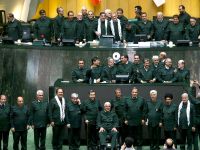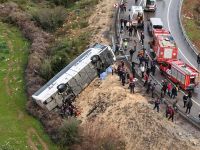By Mahmoud Al Abed
Lebanese voters in the first round of the parliamentarian elections used the ballots to convey a clear message to the government.
With the election of opponents to Syrian presence in the country that woke up from a 15-year bitter civil war, and 22 years of Israeli occupation of 1000 square kilometers of the south, and with all this leaving the country suffering from complicated economic and social problems, the Lebanese apparently want a new face of Lebanon. The elections were their chance to cry out for the change.
“The voters have sent a clear message to those in power who must draw the consequences,” said big winner Walid Jumblatt, who with 21 other opposition figures grasped the lion’s share of the Mount Lebanon seats.
In general, Lebanese columnists and analysts voiced satisfaction at the results and saw favorable winds of change blowing, with a sort of balance kept in the Lebanon’s political life.
“This round gave the state its share of victory. And Jumblatt, Hariri,…the suppressed, the young politicians, the political families who deserve to play a role all have taken their shares, in addition to the qualified, able and clean businessmen,” said An-Nahar daily in an editorial that highlighted the positive aspects of the poll results.
The electorate who chose Jumblatt, Pierre Jmayyel, Boutros Harb and Albert Moukheiber, the long-time critics of Syria, also conveyed a message of rejection to the primary component in the status quo: the Syrian influential presence in the Lebanon, with 35,000 troops stationed there.
An MP of remarkable political and popular weight like Najah Wakim, a pan-Arabist, had declared that he would not run for the elections because “the results were known in advance,” referring to the Syrian influence in deciding who should be under the parliament’s dome.
Accusations of vote rigging poured in advance from the opposition, warning that pseudo-democracy would prevail if the pro-Syrian elements will remain in power.
But according to analysts, Syria played the game wisely this time.
Despite the incidents of vote rigging the bullying exercised by government agents reported by the Lebanese Association for Democracy of Elections, which had earlier denounced the election as "unfair and unfree," things were fine.
Irregularities were there, but not as many as what had been expected by the opposition, and the results of the first round gave a kind of peace of mind to the pessimists.
According to Reuters, quoting Lebanese analysts, Syria may have avoided interfering directly in Lebanon’s election to warn its allies in powerful positions to halt the petty feuds that have clogged decision-making.
"Syria is showing its Lebanese allies that no one is all-powerful or indispensable. They are showing some people that their powers have hit their limits," one analyst said.
Not only that, but it is obvious that the new Syrian president, who took charge of the Lebanese file since 1994, wanted things to work out differently this time, without losing ground on the Lebanese front at the same time.
In spite of the clear win of the opposition in Mount Lebanon, in the north several pro-Syrian lists shared the 28 seats, and the wealthy families of the north, with whom Syria has established deep loyalty, remained the dominant leaders of the area.
According to Reuters, some analysts said Syria’s new president, Bashar Assad, had told the Lebanese authorities to ensure the election was free and fair to back up his promises of reform. They said he sought to give Lebanon a margin of freedom without compromising Syria’s overall control.
"Bashar wants his first Lebanese elections not to fail and not to be rigged," the agency quoted Rozana Abou Monsef in An-Nahar as saying.
"So despite the gerrymandering and the cooking-up of election tickets and alliances, he was keen to give some leeway on the ground for people to vote for opposition figures -- but of course only within what (Syria) deems appropriate."
Syria could have disallowed the rise of the opposition candidates," Hassan Krayim, head of the Lebanese Association for Democracy of Elections told Reuters.
Unfortunately for the Lebanese who want to rid themselves of the reins of Syria, the big brother still has the final say.
The second and the final stage of the elections will take place on September 3rd in Beirut, the Bekaa Valley, and the liberated south. There, the residents will be able to vote for the first time.
© 2000 Al Bawaba (www.albawaba.com)







